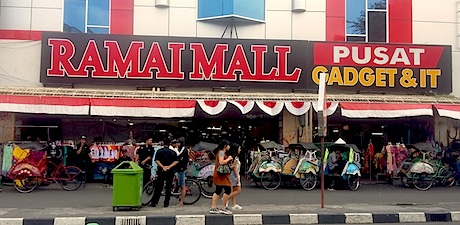Everybody who comes to Indonesia will soon realize one fact for sure: This country is rich of people. In the streets, at public city or village squares and especially at places of interest in nature you will meet crowds of people walking, cruising, sitting around. This is the Asian bustle, as it is known by stereotype around the world. And you know, Indonesians like it that way: They like it ramai.
Ramai translated into English means “busy” or “crowded”. And different to its interpretation in many Western cultures, it is used in 99,9% of all cases positive. In some contexts ramai or beramai-ramai is even translated with “happy”, “hilarious” or “cheerful”. So, crowds make happy!
CULTURAL KNOWLEDGE INDONESIA SERIES
This is another article of the CULTURAL KNOWLEDGE INDONESIA SERIES. In this blog, I discuss regularly cultural concepts of Indonesia as well as weird, funny or critical cross-cultural situations between expats and Indonesians. Stay tuned!
The beach trip
But happy is often not at all the emotional state that overcomes expats when facing crowds of people in Indonesia. Imagine you are invited to a beach trip like me some years ago. “Yeah!” I thought and pictures of a quiet beach with palm trees and the sound of the ocean waves were flashing up in my mind´s eye. But what my Indonesian friends had in mind was a completely different kind of holiday. I became suspicious as we drove along the beach road and started to wonder where all those cars and tour busses went to, as my friend Novi rolled down the window, gazed outside and cheered with shining eyes, “Ramai-ramai, asyik!” – “It´s so crowded, this is awesome!”
No, they didn´t want to spend a quiet beach day and listen to the sound of the waves. They wanted to have lots of people around them. And Dangdut music. They wanted ramai-ramai! And they (as well as me) got it. For me it was a nightmare of a beach trip. I blamed myself, “I should have known it”. And I blamed my friends, “How can you like such a crowded beach???”
But blaming my friend and the Indonesians for their (from my point of view) weird customs of having a beach day is not fair. Especially not when I remember the happy faces of all those people there: They had SO much fun! That´s why I find it better to understand: What is it that makes Indonesians enjoy ramai-ramai?
Reason No. 1: The most normal condition of life
Since their first moment of life, children are surrounded by many people. Beside the parents, there are always grandmas, aunties, cousins and neighbors taking care of them. People grow up with the experience of always being among others. They are part of a big community and hardly ever spend time alone. Having people around you is therefore the most normal condition of life. And here applies the motto: The more, the merrier.
Reason No. 2: Ramai means safety
Imagine, you have been among others all your life long and then you are suddenly alone. How would this feel? Yes, strange and fearful. That´s why Indonesians feel safe when they are part of a group. Preferably a big group. The opposite of ramai, quietness and loneliness (sepi), has therefore often a negative meaning. Also my beach trip friend Novi stated, “A quiet beach? Well, it looks nice but staying there alone all day? This is scary!”
Reason No. 3: Ramai is inspiration
At this point it has become clear: In a vivid environment Indonesians feel happy. But often there is more than just fulfilling the human need for socialization. By meeting lots of people e.g. at the beach, you have the chance to find new friends. To welcome new characters in your life. To experience funny things with them. To listen to new stories. Short: To get inspiration. With being among many people, Indonesians also nourish their community-based soul. And this creates a feeling of deep satisfaction in their heart.
Reason No. 4: Ramai is requested by society
Have you ever been invited to a birthday party in Indonesia? Or to a wedding? Then you may have got an impression about the common size of those events. Private parties but also business gatherings, seminars or launching/welcome/farewell events are celebrated in BIG size with many, many people. Why? First of all, the hosts have to invite all people that are somehow related to them due to the expectation of the society. Besides that it applies: Only a ramai party, is a good party. And here, ramai means everything from “busy” via “crowded” till “cheerful”.
How does ramai-ramai look in daily life?
On your walks through Indonesian daily life pay attention to your surroundings. You may come across the word ramai quite often. Even a whole shopping mall (see picture) carries it in its name. There are also the posters and billboards of a popular cigarette brand that has made “Asyiknya rame-rame” its slogan. And have you ever wondered why there are so many minivans driving on Indonesia´s roads? People just need big sized cars to make sure the whole gang fits in. These family cars as well as big tour busses you will then meet again once you go on a sightseeing trip. And there they stand in dozens, nicely aligned at the mega-sized parking space and waiting for their hundreds of cheerful holiday-mood passengers.

Honestly, personally I struggle quite often to see the ramai phenomenon in a positive light. I just love a certain level of quietness in my life. But what helps me to make peace with ramai-ramai and other foreign cultural concepts is to see the world with the eyes of the Indonesians. And regarding this topic, I just remember how cheerful it is to hang out with my friends and have a lot of fun. Ramai-ramai describes exactly this feeling, only using bigger numbers of people…
How about you? Although you also may come from a less-vivid culture, you definitely can imagine this, can´t you? Let me know your experiences and leave a comment below!
As always at this final point of my posts, I´d love to encourage you to also see situations of cross-cultural life from different perspectives. Be inspired by the fascination of living in a different culture and use this unique chance to learn about people, cultures, yourself – about life!
Did you like what you were reading? If yes, please don´t forget to give me thumbs and share this article. Thank you!
Stay connected with Culturenergy! Like my page on Facebook and follow me on Instagram!
Are you wondering about cultural differences? Or do you even struggle with settling in and adjusting to everyday life in a new country? Just click here and drop me a line. I´m happy to help!




 Just
Just